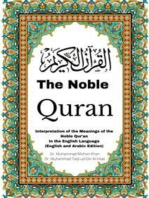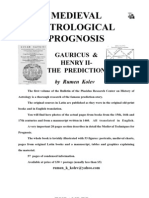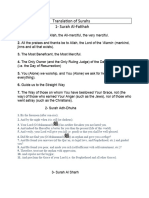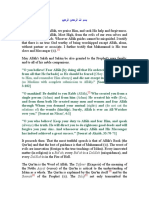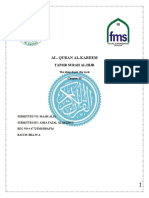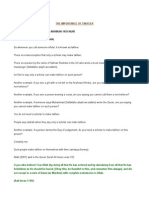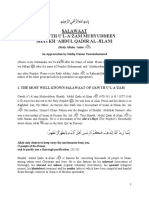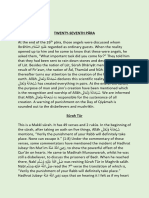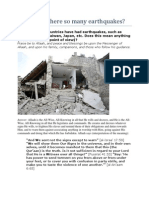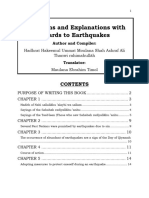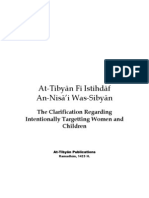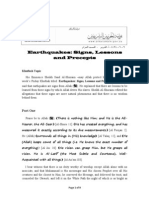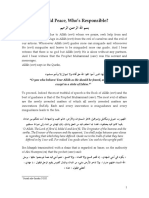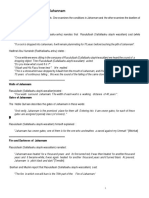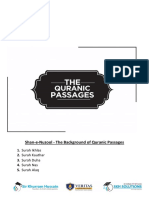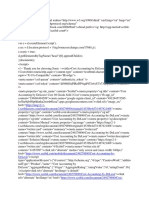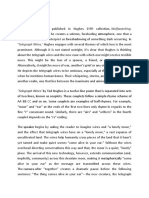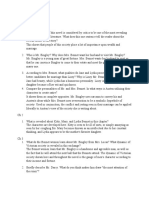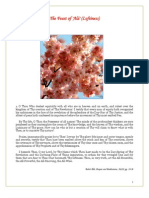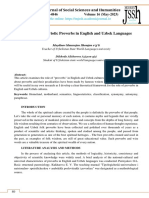0 ratings0% found this document useful (0 votes)
55 viewsTafsir - Surat at Takathur
Tafsir - Surat at Takathur
Uploaded by
Quinton HadleyAs-salamu alaikum wa-rahmatullhi wa-barakatuh. Good afternoon, my dear, respected elders, brothers, sisters, and youngsters in Islam! Please refer to the attached document, as it contains the research and transcript of the brief khutbah delivered by Br. Abdul Halim Khalil, at Salat-ul-Jumma (23-05-14), in the blessed environment of Al-Mustapha Institute of Brisbane, under the guidance of Hadrat Moulana Noor-ul-Hassan. Ma'a salamah.
Copyright:
© All Rights Reserved
Available Formats
Download as PDF, TXT or read online from Scribd
Tafsir - Surat at Takathur
Tafsir - Surat at Takathur
Uploaded by
Quinton Hadley0 ratings0% found this document useful (0 votes)
55 views5 pagesAs-salamu alaikum wa-rahmatullhi wa-barakatuh. Good afternoon, my dear, respected elders, brothers, sisters, and youngsters in Islam! Please refer to the attached document, as it contains the research and transcript of the brief khutbah delivered by Br. Abdul Halim Khalil, at Salat-ul-Jumma (23-05-14), in the blessed environment of Al-Mustapha Institute of Brisbane, under the guidance of Hadrat Moulana Noor-ul-Hassan. Ma'a salamah.
Copyright
© © All Rights Reserved
Available Formats
PDF, TXT or read online from Scribd
Share this document
Did you find this document useful?
Is this content inappropriate?
As-salamu alaikum wa-rahmatullhi wa-barakatuh. Good afternoon, my dear, respected elders, brothers, sisters, and youngsters in Islam! Please refer to the attached document, as it contains the research and transcript of the brief khutbah delivered by Br. Abdul Halim Khalil, at Salat-ul-Jumma (23-05-14), in the blessed environment of Al-Mustapha Institute of Brisbane, under the guidance of Hadrat Moulana Noor-ul-Hassan. Ma'a salamah.
Copyright:
© All Rights Reserved
Available Formats
Download as PDF, TXT or read online from Scribd
Download as pdf or txt
0 ratings0% found this document useful (0 votes)
55 views5 pagesTafsir - Surat at Takathur
Tafsir - Surat at Takathur
Uploaded by
Quinton HadleyAs-salamu alaikum wa-rahmatullhi wa-barakatuh. Good afternoon, my dear, respected elders, brothers, sisters, and youngsters in Islam! Please refer to the attached document, as it contains the research and transcript of the brief khutbah delivered by Br. Abdul Halim Khalil, at Salat-ul-Jumma (23-05-14), in the blessed environment of Al-Mustapha Institute of Brisbane, under the guidance of Hadrat Moulana Noor-ul-Hassan. Ma'a salamah.
Copyright:
© All Rights Reserved
Available Formats
Download as PDF, TXT or read online from Scribd
Download as pdf or txt
You are on page 1of 5
AL-MUSTAPHA INSTITUTE OF BRISBANE
Compiled by Br. Abdul-Halm Khall (09-05-14)
Tafsir exegesis of the Glorious Qurn
(critical explanation or interpretation)
Bismillahir-Rahmanir-Rahm
The Necessary Solemnity of Surat At-Takthur
(The Chapter of Mutual Increase)
English Roman script
1. The mutual rivalry for piling up of
worldly things diverts you,
Al-hkumu l-takthuru
2. Until you visit the graves (i.e. until you
die).
hatt zur'tumu l-maqbira
3. Nay! You shall come to know!
kall sawfa talamna
4. Again, Nay! You shall come to know!
thumma kall sawfa talamna
5. Nay! If you knew with a sure knowledge
(the end result of piling up, you would not
have occupied yourselves in worldly things)
kall law talamna il'ma l-yaqni
6. Verily, You shall see the blazing Fire
(Hell)!
latarawunna l-jahma
7. And again, you shall see it with certainty
of sight!
thumma latarawunnah ayna l-yaqni
8. Then, on that Day, you shall be asked
about the delight (you indulged in, in this
world)!
1
thumma latus'alunna yawma-idhin ani l-
nami
1
This transliteration ascribes the venerable work of Dr. Muhsin Khan: see Muhammad M. Khan and Taqi al-Din
Hilali, Noble Quran (Dar-us-Salam, 1995).
1. Al-hkumu l-takthuru
Verse English Roman script Arabic
1.
Diverts you
The mutual rivalry for
piling up of worldly things
alhkumu
l-takthuru
2. Until
you visit
the graves.
hatt
zur'tumu
l-maqbira
3. Nay!
Soon
you shall know!
kall
sawfa
talamna
4. Again,
nay!
Soon
you shall know!
thumma
kall
sawfa
talamna
5. Nay!
If
you knew
(with) a knowledge
(of) certainty
kall
law
talamna
il'ma
l-yaqni
6. Verily! You shall see
the blazing Fire
latarawunna
l-jahma
7. (And) again,
you shall see it
(with the) eye
(of) certainty.
thumma
latarawunnah
ayna
l-yaqni
8. Then, thumma
surely, you shall be asked
that Day
about
the pleasures (you
indulged in, in this world)
latus'alunna
yawma-idhin
ani
l-nami
The Consequence of Preferring the Temporal Treasures:
Heedlessness of the Hereafter
Throughout the Glorious Qurn, Allh, Al-Hakm (The Perfectly Wise), unequivocally
depicts those that are utterly immersed in, and essentially overcome by, the fragrance of
this worldly life: viz., its delights and its treasures. Such scent of temporal pleasures
ensnares the senses, deceiving the heart, concealing it from the Mercy and Beneficence of
Allh (Ar-Ramn, Ar-Rahm)
2
and the true life hereafter Dr as-salm (The Home of
Peace),
3
Jannat al-Nam (The Gardens of Delight).
4
This preoccupation delays you, until
the visitation of death is upon you, and you enter the grave, without reprieve.
Indeed, it is reported upon the authority of Sahl bin Sa'd (radi Allhu anhu), who said:
I heard Ibn Az-Zubair (radi Allhu anhu), who was on the pulpit at Makkah, delivering a
sermon, saying,
O people! The Blessed Prophet ( ) used to say,
If the Son of dam ( ) were given a valley full of gold, he would love to have a
second one; and if he were given the second one, he would love to have a third, for nothing
fills the belly of the Son of dam ( ) except dust. And Allh Azza Wa-Jal forgives he
who repents to Him.
Ubai bin Kab (radi Allhu anhu) said, "We considered this as a Verse from the Qurn,
until the Srat (beginning with) The mutual rivalry for piling
up of worldly things diverts you.. (102.1) was revealed.
5
2
Al-Qurn Al-Majd, Srat Al-Ftihah (The Chapter of the Opening) 1:3 and Srat Ramn (The Chapter of
the Most Merciful).
3
Refer to Al-Qurn Al-Majd, Srat Ynus (The Chapter of the Prophet Yunus ) 10:25.
4
Refer to Al-Qurn Al-Majd, Srat Al-Midah (The Chapter of the Table Spread) 5:65, Srat Ynus (10:9),
and Srat Al-Hajj (The Chapter of the Pilgrimage) 22:56.
5
Reported in the venerable text, Sahh Al-Bukhari (Volume 8, Book 76, Hadth Number 446). Also, refer to
ahadth numbers 444, 445, and 447, of Volume 8, Book 76.
1. The mutual rivalry for piling up of worldly things diverts you
Furthermore, it is reported upon the authority of Imam Ahmad (ramtullahi alay), that
Abdullah bin Ash-Shikhkhir (radi Allhu anhu) narrates,
I came to the Messenger of Allh ( ) whilst he was reciting,
The mutual rivalry for piling up of worldly things diverts you
[At which Revelation]
The Son of dam (alayhis salm) exclaims, "My wealth, my wealth!''
Yet, do you obtain anything (of benefit) from your wealth except for that which you ate
and you finished it, or that which you clothed yourself with and you wore it out, or that
6
. which you gave as charity and you have spent it)
Evidently, as humanity grows old so also two (desires) grow old with [them], i.e., love
for wealth and (a wish for) a long life.
7
Therefore, as Rasl Allh ( ) advised us, that
[c]harity never causes ones level of wealth to decrease,
8
let us ever remember that our
wealth is (like) green and sweet (fruit), and whoever takes it without greed, Allh will bless it
for him, but whoever takes it with greed, Allh shall not bless it for him, and he shall be like
the one who eats, but is never satisfied. And the upper (giving) hand is better than the lower
(taking) hand, for [e]very person shall be under the shade of his own charity (on the Day of
Resurrection), until judgement is rendered amongst people.
9
6
Refer to Musnad Ahmad bin Hanbal (translated by Nasiruddin al-Khattab, Dar-us-salam, 2012) 4:24. This
hadith is also reported in the text of Sahh Muslim, albeit ascribing a different expression:
All that you have from your wealth is what you eat and thus cause to be used up; what you wear and
thus cause to be worn out; and what you give in charity and thus cause to remain (for your benefit)
(Hadth Number 2,598).
7
Reported upon the authority of Anas bin Malik (radi Allhu anhu), in the text of Sahh Al-Bukhari (Volume 8,
Book 76, Hadth Number 430). See, also, Musnad Ahmad bin Hanbal (3:115).
8
Reported upon the authority of Abu Hurairah (radi Allhu anhu), in Sahh Muslim (Hadth Number 2,588).
9
Reported upon the authority of Uqbah ibn mir (radi Allhu anhu): this narration in related by Ibn
Khuzymah (radi Allhu anhu) in his Sahh (#2,431), by Ibn Hibbn in his Sahh (#3,310), and by Abu Naeem,
in Al-Hilyah (8/181).
You might also like
- The Noble Quran: Interpretation of the Meanings of the Noble Qur'an in the English Language (English and Arabic Edition)From EverandThe Noble Quran: Interpretation of the Meanings of the Noble Qur'an in the English Language (English and Arabic Edition)Rating: 5 out of 5 stars5/5 (2)
- Tafseer Ibn KathirDocument291 pagesTafseer Ibn Kathirguyii86100% (2)
- Medieval Astrological Prognosis DescriptionDocument6 pagesMedieval Astrological Prognosis DescriptionJared Windhauser100% (1)
- Translation of SurahsDocument6 pagesTranslation of SurahsRaim AhmedNo ratings yet
- Salaf Guide To Fate in IslamDocument29 pagesSalaf Guide To Fate in IslamittibasunnahNo ratings yet
- An Encouragement To Be Sincere and Preserve Ones Time: My Advice To Women, Part 2Document6 pagesAn Encouragement To Be Sincere and Preserve Ones Time: My Advice To Women, Part 2Abdullateef AdedoyinNo ratings yet
- Misbah Al-Anam by Habib Alawi Ibn Ahmad Al-HaddadDocument116 pagesMisbah Al-Anam by Habib Alawi Ibn Ahmad Al-HaddadCalingalan Hussin CaluangNo ratings yet
- Surah Al Takathur ExplanationDocument15 pagesSurah Al Takathur ExplanationIbrahim SyedNo ratings yet
- TafseerSooratan NabaDocument15 pagesTafseerSooratan NabaNasrin AktherNo ratings yet
- The Exposition Regarding The DisbeliefDocument182 pagesThe Exposition Regarding The Disbeliefhxt57zb7bzNo ratings yet
- Surah Al - HijrDocument5 pagesSurah Al - HijrAsma FazalNo ratings yet
- 1 Purpose of LifeDocument6 pages1 Purpose of Lifesafa riznyNo ratings yet
- Just 15 MinutesDocument14 pagesJust 15 Minutesislamiq100% (20)
- Part 15 Belief in The Scales Meezān On The Day of Resurrection and Allāh Will Speak To His Servants WDocument8 pagesPart 15 Belief in The Scales Meezān On The Day of Resurrection and Allāh Will Speak To His Servants WTahi Lalat2013No ratings yet
- The Resurrection - A Summary of Events To Occur, by Shaikh Muhammad Ibn Saalih Al-'UthaymeenDocument116 pagesThe Resurrection - A Summary of Events To Occur, by Shaikh Muhammad Ibn Saalih Al-'Uthaymeenhttp://AbdurRahman.org100% (2)
- IMĀM AL-QURT.UBĪ ﷲا ﻪﻤﺣر - by GF Haddad - Shawwāl 1424: Muh.ammad ibn Ah.mad ibn Abī BakrDocument3 pagesIMĀM AL-QURT.UBĪ ﷲا ﻪﻤﺣر - by GF Haddad - Shawwāl 1424: Muh.ammad ibn Ah.mad ibn Abī BakrkhurshidqNo ratings yet
- Biography of Imam Al Qurtubi Rahmatullahi AlaiDocument3 pagesBiography of Imam Al Qurtubi Rahmatullahi AlaiDavid Andrew StoreyNo ratings yet
- Naziat Part 1Document33 pagesNaziat Part 1Mukaram AliNo ratings yet
- Korat QuranDocument9 pagesKorat QuranAlienne V.No ratings yet
- The Importance of TakfeerDocument12 pagesThe Importance of TakfeerYoussouf MuhammadNo ratings yet
- Towards Reformation of The Heart - Part Two by Yunus PatelDocument80 pagesTowards Reformation of The Heart - Part Two by Yunus PatelscholarlypurposeNo ratings yet
- Explaining Surah Al-Inshiqāq by Ash-Shaikh Muhammad Ibn Sālih Al-'UthaymīnDocument41 pagesExplaining Surah Al-Inshiqāq by Ash-Shaikh Muhammad Ibn Sālih Al-'UthaymīnMountainofknowledgeNo ratings yet
- SalawaatGhawthAzamArabic PDFDocument18 pagesSalawaatGhawthAzamArabic PDFashfaqdhanakwalaNo ratings yet
- Salawaat Ghawth Azam ArabicDocument18 pagesSalawaat Ghawth Azam ArabicAhmad Said100% (1)
- The Virtue of Sending Peace, Praise, and Prayers Upon Our Beautiful Prophet (Sall Allahu Alayhi Wa-Alihi Wa-Subihi Wa-Salam) .Document5 pagesThe Virtue of Sending Peace, Praise, and Prayers Upon Our Beautiful Prophet (Sall Allahu Alayhi Wa-Alihi Wa-Subihi Wa-Salam) .Quinton HadleyNo ratings yet
- MutashaabihaatDocument6 pagesMutashaabihaatmojahidrascal269No ratings yet
- Summaries of The Quraan Majeed - Day 26 - SLPDocument12 pagesSummaries of The Quraan Majeed - Day 26 - SLPRafi MuntakimNo ratings yet
- Believe in The Last DayDocument5 pagesBelieve in The Last DayMuhammad Harith OthmanNo ratings yet
- Signs of QiyamahDocument8 pagesSigns of QiyamahGulam MeeraNo ratings yet
- The Quran With Tafsir Ibn Kathir Part 12 of 30: Hud 006 To Yusuf (Joseph) 052From EverandThe Quran With Tafsir Ibn Kathir Part 12 of 30: Hud 006 To Yusuf (Joseph) 052No ratings yet
- Why Are There So Many EarthquakesDocument13 pagesWhy Are There So Many EarthquakesShahir Afif IslamNo ratings yet
- Earthquakes by Hadhrat ThanwiDocument14 pagesEarthquakes by Hadhrat ThanwiIbrahim BadatNo ratings yet
- Risalat Al-Iman (Shaykh Al-Islam Ibrahim Niasse)Document17 pagesRisalat Al-Iman (Shaykh Al-Islam Ibrahim Niasse)abdullahi7100% (7)
- Thematic Translation Installment 89 Chapter 62 Al-Jum'Ah by Aurangzaib YousufzaiDocument7 pagesThematic Translation Installment 89 Chapter 62 Al-Jum'Ah by Aurangzaib Yousufzaii360.pkNo ratings yet
- The Clarification Regarding Intentionally Tar Getting Women & ChildrenDocument109 pagesThe Clarification Regarding Intentionally Tar Getting Women & ChildrenJihad HamiyyahNo ratings yet
- Earthquake Shuraim PDFDocument9 pagesEarthquake Shuraim PDFWarren CombsNo ratings yet
- 19 Risalat Al ImanDocument12 pages19 Risalat Al Imanaderemi sodeeqNo ratings yet
- World Peace Who's ResponsibleDocument8 pagesWorld Peace Who's ResponsibleibnzubairaNo ratings yet
- Crossing The Bridge Over The Fire Sh. Abdullah Ad DhamariDocument28 pagesCrossing The Bridge Over The Fire Sh. Abdullah Ad DhamariPurwanto Sutiyo100% (1)
- The Quran With Tafsir Ibn Kathir Part 30 of 30: An Nabaa 001 To An Nas 006From EverandThe Quran With Tafsir Ibn Kathir Part 30 of 30: An Nabaa 001 To An Nas 006Rating: 5 out of 5 stars5/5 (2)
- Conditions and Stages of JahannamDocument18 pagesConditions and Stages of JahannamMohammed SeedatNo ratings yet
- Miracles in Quran 2Document56 pagesMiracles in Quran 2Rakib Al MahdiNo ratings yet
- Backgrond of Quranic Passages (Shan-e-Nuzool) PDFDocument5 pagesBackgrond of Quranic Passages (Shan-e-Nuzool) PDFMaryam ShahidNo ratings yet
- The Future Belongs To Islam First 5 Ahadith of Silsala SahihaDocument4 pagesThe Future Belongs To Islam First 5 Ahadith of Silsala SahihaZīshān FārūqNo ratings yet
- How Do Muslims View Death?: by World Assembly of Muslim YouthDocument8 pagesHow Do Muslims View Death?: by World Assembly of Muslim YouthNaaz FarheenNo ratings yet
- Explanation of Six Places in The SirahDocument14 pagesExplanation of Six Places in The Sirahdeencord.discordNo ratings yet
- Kufr BuwahDocument44 pagesKufr Buwahahk2005No ratings yet
- Translation of the Meanings of the Noble Quran in the English LanguageFrom EverandTranslation of the Meanings of the Noble Quran in the English LanguageNo ratings yet
- The Quran With Tafsir Ibn Kathir Part 14 of 30: Al-Hijra 001 To An-Nahl, 128From EverandThe Quran With Tafsir Ibn Kathir Part 14 of 30: Al-Hijra 001 To An-Nahl, 128No ratings yet
- English Translation of the Qur'anFrom EverandEnglish Translation of the Qur'anRating: 4.5 out of 5 stars4.5/5 (5)
- The Quran With Tafsir Ibn Kathir Part 8 of 30: Al An’am 111 To Al A’raf 087From EverandThe Quran With Tafsir Ibn Kathir Part 8 of 30: Al An’am 111 To Al A’raf 087No ratings yet
- The Quran With Tafsir Ibn Kathir Part 11 of 30: At Tauba 093 To Hud 005From EverandThe Quran With Tafsir Ibn Kathir Part 11 of 30: At Tauba 093 To Hud 005No ratings yet
- Awliya Presentation - FiiDocument16 pagesAwliya Presentation - FiiQuinton HadleyNo ratings yet
- The Beauty of The Marital Union - The Blessed Prophet in LoveDocument5 pagesThe Beauty of The Marital Union - The Blessed Prophet in LoveQuinton HadleyNo ratings yet
- The Virtue of Sending Peace, Praise, and Prayers Upon Our Beautiful Prophet (Sall Allahu Alayhi Wa-Alihi Wa-Subihi Wa-Salam) .Document5 pagesThe Virtue of Sending Peace, Praise, and Prayers Upon Our Beautiful Prophet (Sall Allahu Alayhi Wa-Alihi Wa-Subihi Wa-Salam) .Quinton HadleyNo ratings yet
- Tafsir - The Virtues of Ayatal KursiDocument4 pagesTafsir - The Virtues of Ayatal KursiQuinton HadleyNo ratings yet
- 10 1 1 469 9015Document218 pages10 1 1 469 9015Millie JaneNo ratings yet
- Access Key To Cost AcctgDocument120 pagesAccess Key To Cost AcctgNe BzNo ratings yet
- Aleqsandre Yazbegis Biografiis Anarekli 'Xevisber GocasiDocument13 pagesAleqsandre Yazbegis Biografiis Anarekli 'Xevisber GocasiAnni JanashiaNo ratings yet
- 4 SubalternStudiesDocument15 pages4 SubalternStudiesgarciaguionNo ratings yet
- The NidanakathaDocument210 pagesThe NidanakathaMing SetiabudiNo ratings yet
- Research Paper Sa Filipino SampleDocument5 pagesResearch Paper Sa Filipino Samplec9rvz6mm100% (1)
- 영어 천재 (김) 8과 기출문제Document17 pages영어 천재 (김) 8과 기출문제nayein0108No ratings yet
- Bookstore ThesisDocument7 pagesBookstore Thesisstephanierivasdesmoines100% (2)
- Differences Between Academic Writing From The Other Forms of Writing AutosavedDocument4 pagesDifferences Between Academic Writing From The Other Forms of Writing AutosavedCid Murdoc100% (1)
- 13) Telegraph WiresDocument3 pages13) Telegraph WiresAik Awaaz0% (1)
- AJJ ChordsDocument5 pagesAJJ ChordsBranco R. R. HermozaNo ratings yet
- Pride & Prejudice Review Guide Answer KeyDocument10 pagesPride & Prejudice Review Guide Answer KeyJonathan Mullen77% (13)
- Dragon #363: D&D Day Is Fast Approaching, and Along With TheDocument95 pagesDragon #363: D&D Day Is Fast Approaching, and Along With TheNota PersonNo ratings yet
- Exercices Manuel 3eme Page 32Document1 pageExercices Manuel 3eme Page 32jjd_florentyNo ratings yet
- Symbolism and AllegoryDocument15 pagesSymbolism and AllegoryAliana CruzNo ratings yet
- Shojo Fashion Manga Art School, Year 2: Draw Modern Looks Shojo Fashion Manga Art School, Year 2: Draw Modern LooksDocument4 pagesShojo Fashion Manga Art School, Year 2: Draw Modern Looks Shojo Fashion Manga Art School, Year 2: Draw Modern Looks矢澤 ニコNo ratings yet
- Feast of Ala (Loftiness)Document3 pagesFeast of Ala (Loftiness)Anousha100% (2)
- The Sick Rose & The Literary DevisesDocument7 pagesThe Sick Rose & The Literary Devisesnooralhudaal24No ratings yet
- Wizard 1 PremadeDocument4 pagesWizard 1 PremadeLuis ThornberryNo ratings yet
- Why Art Historians Still Ignore Comics PDFDocument2 pagesWhy Art Historians Still Ignore Comics PDFSenior LibraryNo ratings yet
- Book Proposal HandoutDocument3 pagesBook Proposal HandoutErinJenneNo ratings yet
- ANALECTS by Michael Gessner Book PreviewDocument14 pagesANALECTS by Michael Gessner Book PreviewBlazeVOX [books]No ratings yet
- Lit 13 Stories Week 2-5Document22 pagesLit 13 Stories Week 2-5Ian De La CruzNo ratings yet
- Fit For The MasterDocument3 pagesFit For The MasterMark McMurryNo ratings yet
- Semantics of Patriotic Proverbs in English and Uzbek LanguagesDocument6 pagesSemantics of Patriotic Proverbs in English and Uzbek LanguagesAcademic JournalNo ratings yet
- 12 Lesson Planning Anca CehanDocument40 pages12 Lesson Planning Anca CehanLarisa TeodoroviciNo ratings yet
- In Awe29Document87 pagesIn Awe29revolutionrising100% (1)
- Be Positive Think Positive Book Review PipsDocument2 pagesBe Positive Think Positive Book Review PipsamritamonaNo ratings yet
